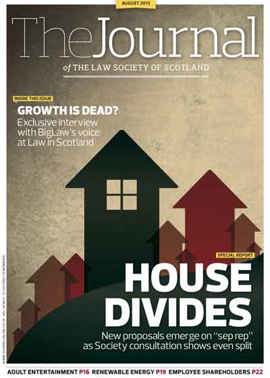The bigger they are...

An American of Scottish ancestry, whose brand “Adam Smith, Esq.” adopts the name of our greatest economist, but who has spent his career in the “BigLaw” environment of Manhattan, is to deliver a keynote address at the Society’s Law in Scotland conference on 24 September. Who is he, and why has he been hired?
Bruce MacEwen’s reputation as a practical, no-nonsense adviser has been much enhanced since the publication earlier this year of his book Growth is Dead: Now What?, enthusiastically reviewed at Journal, July 2013, 7. It pulls no punches about why the boom times of constantly rising revenues and profits have ended for America’s leading law firms, and the challenge they face in adapting to the new market they now find themselves in.
MacEwen’s analysis is that BigLaw faces unique challenges, but exploring his reasons elicits a picture with a familiar ring as respects major firms this side of the Pond.
“This may sound odd,” he comments, “but I think part of the challenge facing BigLaw is that its clients are sophisticated, more sophisticated than clients of small town lawyers or the high street.” These clients know it may be more cost-effective to go to other law firms, maybe regional mid-market firms, or that even if they have to go to the Magic Circle or the New York elite, they have some bargaining power in terms of price. But the most challenging phenomenon now emerging, he continues, is the alternative providers such as legal process outsourcers: “They’re providing a service which is much more threatening, because they’re a substitute for BigLaw.”
Particularly at risk, as UK firms are coming to recognise, is work that is open to process efficiencies that enhance quality without requiring highly paid associates. “BigLaw is fantastic at delivering very high end sophisticated strategic counsel, but frankly they are terrible at running processes in an efficient, organised, optimised way. They’ve never been asked to do it, so they’ve never developed that expertise.”
Growth, but not as we know it
So when you say “Growth is dead”, I ask, does that really mean that the work is still there but is being shared round more different providers?
“Correct. We’re not the newspaper industry, the buggy whip industry. There are reasons to suspect that the demand for sophisticated legal services is going to grow at least with population growth, given the march of globalisation, the growth of regulatory complexity. But that’s a very different observation from the really important question, I think, which is where will the supply come from, and what will the market share of the various firms look like? We are increasingly in a battle for market share, which is very different from a continuous rising tide that lifts all boats.” Part of MacEwen’s prescription, and again this is recognised by successful UK practices, is that firms move from being ready to step in when clients need them, to aiming proactively to solve clients’ problems. “What clients would really appreciate, and I was one for 10 years [in an in-house position], is firms saying, have you thought about this regulation, this phenomenon that we see developing in the market, and we have some thoughts on how you can get ahead of that. That sort of thing would be incredibly valuable. A managing partner of a large firm here in New York calls it, somewhat facetiously, ‘the ability to see around corners’.” In a nutshell, invent your own future.
Squeezed middle?
Possibly a more contentious point in Growth is Dead is that firms that are neither top end nor niche specialists – particularly mid-sized, full service firms – will find it hard to preserve market share. I suggest that such firms will respond that they have often been written off in the past, but are still thriving, partly through good client relationships. Why should that not continue?
“OK, that’s the $64,000 question, isn’t it? The answer is, I think that can be enough, with three conditions. The first is that the firm itself knows who they are and where they fit in the market. There is room on the market for middle market players. There is nothing wrong with the middle market; you just have to manage it differently than the high end. Condition no 2 goes back to client service. These firms really, really need to take client service seriously.
“And condition no 3 is, I’m assuming that these client relationships are owned, if you will, by relatively senior partners in the firm, and at least here in the States, altogether too many of these senior partners are reluctant to pass on these clients to the next generation. They hoard the clients, with the result that when mortality and age take their course and the senior partner cuts back, the client really does not have a close relationship with anybody else in the firm. That’s an enormous problem.”
Personality quirks
Management, and the need to take it seriously, is another key theme for MacEwen. Referring to the “C-suite”, as it is known in the US (C for chief, as in executive officer/financial officer/information officer etc), he castigates lawyers’ tendency to think that they can effectively perform these non-legal skills themselves, on the side; or to employ others (such as marketing people) on the cheap. “I’m generalising here, but this is true for, I hate to say, 85 or 90% of the industry: they tend to underestimate what those people can do because they’re not lawyers, so they don’t get the best talent, don’t pay them very well, step on their initiatives, and when those people underdeliver, the lawyers say, ‘I told you so!’ It’s an entirely self fulfilling prophecy, and I think law firms would be well advised to hire very talented people in those areas, pay what it takes to get the talent – and most importantly get out of their way!”
Lawyers’ personal traits fascinate MacEwen, and one thing, he believes, that seriously holds them back in adapting to a changing world is an absolute fear of failure. In what sense, though, should failure be acceptable?
“It should be acceptable to fail if you tried something that showed promise, that had reasonable expectation”, he responds. There are, he adds, “a whole bunch of psychological attitudes of lawyers that create a real problem here”. They are incredibly sceptical compared with the general population; they are often insecure despite an outward bluster; and they lack resilience when faced with setbacks.
Scepticism “is a useful characteristic in a solicitor or barrister if you’re a client hiring that person, but it’s a dreadful characteristic in what for all practical purposes is an executive in a sophisticated enterprise, and that’s what partners are, because you need to be able to experiment”. Their insecurity makes them very loth to try anything unproven; and lack of resilience means they take failure very hard.
“So add up all those things and you can understand why firms will have a very hard time exploring even the tiniest deviation from what’s been done before. But in America, and there may be areas in the UK where it’s the same, as long as what you tried was sensible, would have solved the problem if it had worked, failure can almost be seen as a virtue. You can’t make the same mistake twice, but at least in the States the real sin is not failing, but in not picking yourself up and dusting yourself off and jumping back in.”
Apocalypse not now
MacEwen insists he is “not apocalyptic about the future of law firms at all”. While professing to apply “rigour in analysis and tough love in attitude”, he aims to preach “what challenged firms can do to survive and grow, and I really think a lot of it has to do with articulating for clients what they do that is distinctive”.
There is more, in even punchier language, in his book (which will be issued to delegates to “Law in Scotland”), never mind his yet-to-be-revealed conference address. But what has the world of BigLaw to do with the average Scottish practice? Aside from his Scottish descent (from about 250 years back), MacEwen suggests that “The real answer is globalisation. By that I mean we live in a world where ideas, people, cross borders with greater rapidity than ever before, and some of the trends that I see developing here are coming your way, because knowledge travels very fast and things tend to have knock-on effects.”
Not unaware of the mix of recent results from Scottish firms, he adds: “The other reason, and this is more self interest on behalf of your member firms, is get ahead of the curve. Wouldn’t it be interesting if some of your firms came away thinking, ‘We could approach service a little differently; we could improve the way we manage our finances, our technology, our professional development; and wouldn’t that help distinguish us in the eyes of our clients?’”
BigLaw Brother watching?
Manhattan born and bred, Bruce MacEwen majored in economics ahead of law (“I thought a law degree would be a much more rigorous graduate degree than say an MBA”), then practised as a securities lawyer with two large New York firms before continuing his career in-house with Dean Witter (taken over by Morgan Stanley). Looking for new challenges, and failing to find a forum where business and economics issues relating to law firms “were being discussed with the level of sophistication I thought they deserved”, in 2003 he set up “Adam Smith, Esq.” – a high end consultancy combined with an online forum where comment is regularly posted. Now enjoying something of a worldwide following, MacEwen comments: “It’s been incredibly gratifying, and on some level quite surprising, but it’s what I’m passionate about and it’s been very rewarding. And the most rewarding part of it has frankly been the opportunity to meet people from all over the world that I never would have met in a million years.”In this issue
- Widening access to the stocks and gallows?
- Family migration revisited
- The same but different
- Controlling tendency
- ESPC: out of the parental home
- Offshore employment: floating goalposts?
- Reading for pleasure
- Opinion column: David O'Hagan
- Book reviews
- Profile
- President's column
- Make the most of your "multiples"
- Sep rep: all to play for
- The bigger they are...
- Licensed to thrill
- Capacity challenge
- One year, and counting?
- Selling your rights... for what?
- The voice of technology
- A serious matter
- Relocation: where are we now?
- Whistle for reform
- Same sex marriage: for richer, for poorer
- Scottish Solicitors' Discipline Tribunal
- Residential property review takes shape
- In-house lawyers seek a rising star
- Mentoring: the way forward
- How not to win business: a guide for professionals
- Comm prop risks
- Ask Ash
- Crossed purposes
- Conference looks for profession to evolve
- Law reform roundup
- Help with the red flags






